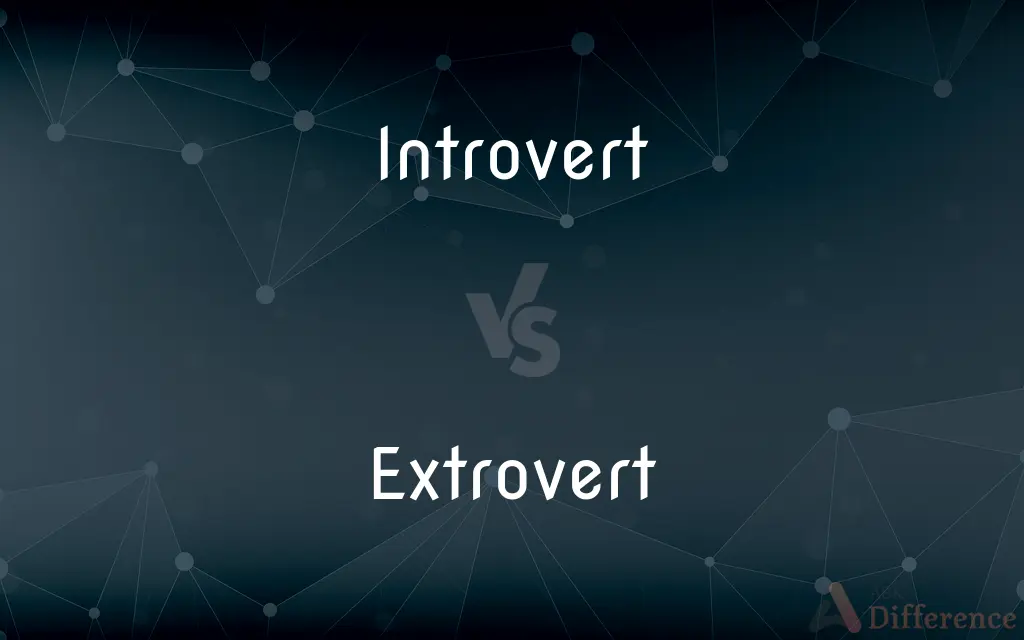Introvert vs. Extrovert — What's the Difference?
By Tayyaba Rehman — Published on September 24, 2023
An introvert is energized by solitude and internal thoughts, while an extrovert gains energy from social interactions and external stimuli.

Difference Between Introvert and Extrovert
Table of Contents
ADVERTISEMENT
Key Differences
An introvert is someone who often feels more comfortable and recharged in solitary or low-stimulus environments. In contrast, an extrovert thrives in social settings and feels energized when interacting with others. Both terms describe different points on the personality spectrum, neither being superior or inferior.
While an introvert might prefer reading a book or engaging in individual activities, an extrovert might be found at a social gathering or participating in group activities. The difference isn't about being shy or outgoing, but rather where individuals draw their energy.
An introvert often processes information internally, thinking deeply and reflecting before speaking. Conversely, an extrovert might process thoughts through talking and actively seeks out external stimuli for processing and decision-making.
The preference of an introvert to delve deep into their inner world does not mean they dislike social interactions. Similarly, while an extrovert might be more socially active, it doesn't imply they lack depth or introspection.
It's crucial to understand that being an introvert or an extrovert isn't a rigid classification. Many individuals exhibit traits of both and might identify as ambiverts, striking a balance between the two personality types.
ADVERTISEMENT
Comparison Chart
Source of Energy
Solitude and internal thoughts
Social interactions and external stimuli
Social Preference
Smaller, more intimate gatherings
Larger, more lively gatherings
Thought Processing
Internally, reflective
Externally, through conversation
Comfort Zone
Low-stimulus environments
High-stimulus, dynamic environments
Typical Activities
Reading, solo hobbies
Group activities, social events
Compare with Definitions
Introvert
An individual who finds energy in solitude and introspection.
As an introvert, Jane often took solitary walks to clear her mind.
Extrovert
A person who processes thoughts by talking them out.
The extrovert discussed her ideas with peers to gain clarity.
Introvert
An individual more sensitive to external stimulation.
Crowded places often overwhelmed the introvert.
Extrovert
An individual who is energized by interacting with others.
The extrovert eagerly attended every social event in town.
Introvert
Someone who typically prefers smaller social settings.
The introvert chose a quiet café over a bustling restaurant.
Extrovert
Someone who thrives in bustling and dynamic settings.
Concerts and festivals were the extrovert's playground.
Introvert
Someone whose focus is primarily inward.
The introvert journaled regularly to explore her inner thoughts.
Extrovert
Someone whose focus is primarily outward.
The extrovert was always curious about the world and its people.
Introvert
A person who processes thoughts and feelings internally.
The introvert contemplated deeply before giving his opinion.
Extrovert
An individual less sensitive to external stimulation.
Noise and crowds rarely bothered the extrovert.
Introvert
To turn or direct inward.
Extrovert
An extroverted person.
Introvert
(Psychology) To concentrate (one's interests) upon oneself.
Extrovert
A person who is extroverted; a person who is marked by an interest in others or concerned primarily with external reality. Contrasted with introvert.
Introvert
(Medicine) To turn (a tubular organ or part) inward upon itself.
Extrovert
(psychology) a person concerned more with practical realities than with inner thoughts and feelings
Introvert
(Psychology) An introverted person.
Extrovert
Characterized by extroversion
Introvert
(Medicine) An anatomical structure that is capable of being introverted.
Introvert
(zoology) An organ or other body part that is or can be turned inside out, especially an anterior portion of some annelid worms capable of retraction.
Introvert
(psychology) An introverted person: one who is considered more thoughtful than social, with a personality more inwardly than outwardly directed; one who often prefers to have time in non-social situations.
Introvert
A reserved person.
Introvert
To turn inwards.
Introvert
To think about internal or spiritual matters.
Introvert
(zoology) To withdraw an organ or body part within itself or its base.
Introvert
To turn or bend inward.
Introvert
To look within; to introspect.
Introvert
A person who is introverted; one concerned predominantly with himself or his own feelings. Contrasted with extrovert.
Introvert
A person who is shy.
Introvert
A part that can be introverted{1}.
Introvert
(psychology) a person who tends to shrink from social contacts and to become preoccupied with their own thoughts
Introvert
Fold inwards;
Some organs can invaginate
Introvert
Turn inside;
He introverted his feelings
Common Curiosities
Are all introverts shy?
No, being introverted is not synonymous with shyness; it's about where one draws energy.
Do introverts dislike social events?
Not necessarily; introverts might prefer smaller, more intimate gatherings.
What is an introvert?
An introvert is someone who often feels more comfortable and recharged in solitary or low-stimulus environments.
Do extroverts think out loud?
Many extroverts process their thoughts through talking, seeking external stimuli for decision-making.
Are these terms scientifically proven?
They are widely accepted in psychology, but individuals are complex and may not fit neatly into one category.
Can extroverts be introspective?
Absolutely, extroversion doesn't exclude depth or introspection.
Are extroverts always outgoing?
While many extroverts are outgoing, it's not a strict rule. It's more about drawing energy from social interactions.
Can one's tendency towards introversion or extroversion change over time?
Yes, personalities can evolve based on experiences, environments, and personal growth.
Do introverts have fewer friends than extroverts?
Not necessarily. While introverts might have a smaller social circle, they often form deep, meaningful connections.
How does an extrovert differ from an introvert?
An extrovert thrives in social settings and feels energized when interacting with others, unlike an introvert.
Can extroverts enjoy solitude?
Yes, extroverts can enjoy solitude, but they typically gain energy from social interactions.
Are there careers better suited for introverts or extroverts?
While certain careers might cater to one's tendencies, passion and skill are more critical determinants of career success.
Can someone be both an introvert and extrovert?
Yes, individuals who exhibit traits of both are called ambiverts.
How do introverts typically process thoughts?
Introverts often process thoughts internally, reflecting deeply before speaking.
Is it better to be an introvert or extrovert?
Neither is superior; both have unique strengths and offer diverse perspectives.
Share Your Discovery

Previous Comparison
Feral vs. Stray
Next Comparison
Digital Marketing vs. Traditional MarketingAuthor Spotlight
Written by
Tayyaba RehmanTayyaba Rehman is a distinguished writer, currently serving as a primary contributor to askdifference.com. As a researcher in semantics and etymology, Tayyaba's passion for the complexity of languages and their distinctions has found a perfect home on the platform. Tayyaba delves into the intricacies of language, distinguishing between commonly confused words and phrases, thereby providing clarity for readers worldwide.













































